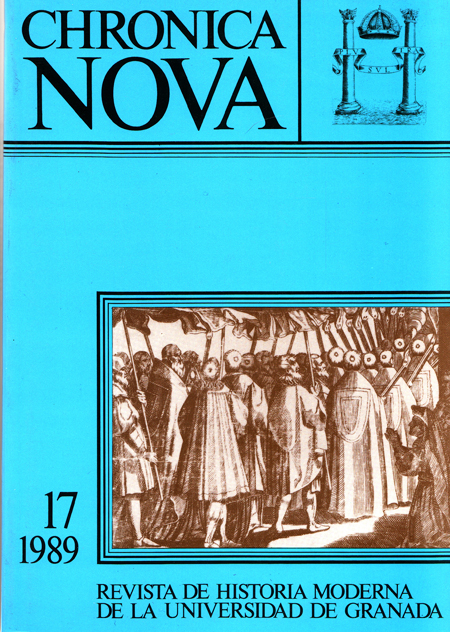El abastecimiento de pescado en el Jaén del siglo XVII
DOI:
https://doi.org/10.30827/cn.v0i17.2826Abstract
The provisioning of a city, especially with wheat, was one of the main concerns of the city councils in the Antiguo Regimen. During Lent it was necessary to supply the city with fish, especially cod, because of the obligatory religious fast. Moreover, fish and bread were the food staple of the poor. Thus there was great interest on the part of cities in obtaining a constant supply of fish.
In this article we analyze the various problems pertaining to this questions, beginning with the public sale of fish by the women in the two city fishmarkets. The capture and sale of freshwater fish was controlled by the city as well, and the greater part of the saltwater fish came from Málaga, Motril and El Puerto de Santa Maria, The contracts of the city councils with purveyors guaranteed this supply. However, in 1659 there was a riot protesting the scarcity of fish, which demonstrates the need for municipal control. The evolution of the price of fish shows a gradual rise until 1680. From 1680 on, fish prices decrease until in the last decade they are the same as they were at the beguining of the century. During Lent each city inhabitant consumed approximately 5.250 grams of fish per day.
Downloads
Downloads
How to Cite
Issue
Section
License
Nuestra revista se atiene a las recomendaciones para la implementación del Artículo 37 Difusión en Acceso Abierto de la Ley de la Ciencia, la Tecnología y la Innovación:
- Los/as autores/as cuyas contribuciones sean aceptadas para su publicación en esta revista conservarán el derecho no exclusivo de utilizar sus contribuciones con fines académicos, de investigación y educativos, incluyendo el auto-archivo o depósito de los artículos aceptados en repositorios institucionales o temáticos de acceso abierto de cualquier tipo en un plazo máximo de seis meses.
- Preferiblemente se permitirá el uso de la versión publicada de las contribuciones científicas, que estarán accesibles en abierto tan pronto como sea posible.
-
Que en caso de que el trabajo sea aprobado para su publicación, el/la autor/a autoriza de manera ilimitada en el tiempo a la entidad editora para que incluya dicho texto en Chronica Nova y pueda reproducirlo, editarlo, distribuirlo, exhibirlo y comunicarlo en el país y en el extranjero por medios impresos, electrónicos, CD, Internet o cualquier otro medio conocido o por conocer.






 ISSN-e: 2445-1908
ISSN-e: 2445-1908










